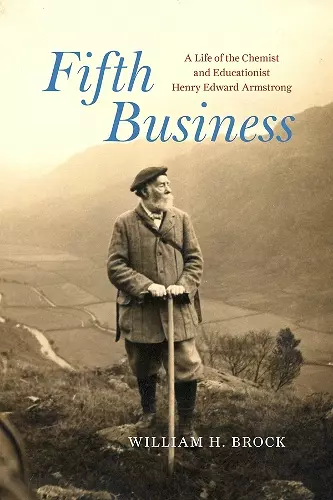Fifth Business
A Life of the Chemist and Educationist Henry Edward Armstrong
Format:Hardback
Publisher:The University of Chicago Press
Publishing:5th Jun '25
£36.00
This title is due to be published on 5th June, and will be despatched as soon as possible.

A biography of Henry Edward Armstrong, an underappreciated maverick in the history of chemistry.
Fifth Business is a biography of the English chemist, educator, and scientific critic Henry Edward Armstrong. Today, Armstrong, who was a central figure in the development of the science of chemistry between 1885 and 1914, is more remembered for his campaigns to improve the teaching of chemistry, and science generally, and less for his theory of residual affinity and reverse electrolysis—or his hostility toward physical chemistry. However, right up until his retirement, Armstrong was a significant and prolific organic chemist, as well as a major figure in the academic and social life of the Chemical Society.
Fifth Business is structured as chronologically as possible, with Armstrong’s life and achievements as an active chemist in Part I (1848–1911) and as a critic in his long retirement in Part II (1911–1937). Brock’s authoritative biography provides a unique inside look at its subject, allowing us to better understand the history of British science, scientific institutions, scientific education, pedagogical theory, and social relations of science during the last third of the nineteenth century and the first third of the twentieth.
“Brock has turned his scholarly focus to Henry Armstrong and restored him to his rightful position as a leading organic chemist as well as an innovator in science education. Drawing on Armstrong’s own words has provided a deeper insight into his character and revealed his wider concerns for the environment and farming.” -- Peter Reed, coauthor of “Henry Enfield Roscoe: The Campaigning Chemist”
“With this wonderful study of the irascible and controversial chemist Henry Armstrong, Brock adds a further figure to his other biographies of nineteenth- and twentieth-century chemists. As Brock makes clear, Armstrong’s significance lies in his close involvement with a large number of scientific institutions through which he promoted his ideas on science education and the place of science in society. By writing this biography, Brock has done an invaluable service to the history of science by rescuing a major figure from undeserved obscurity.” -- Frank James, coeditor of “Being Modern: The Cultural Impact of Science in the Early Twentieth Century”
ISBN: 9780226839585
Dimensions: unknown
Weight: 454g
352 pages